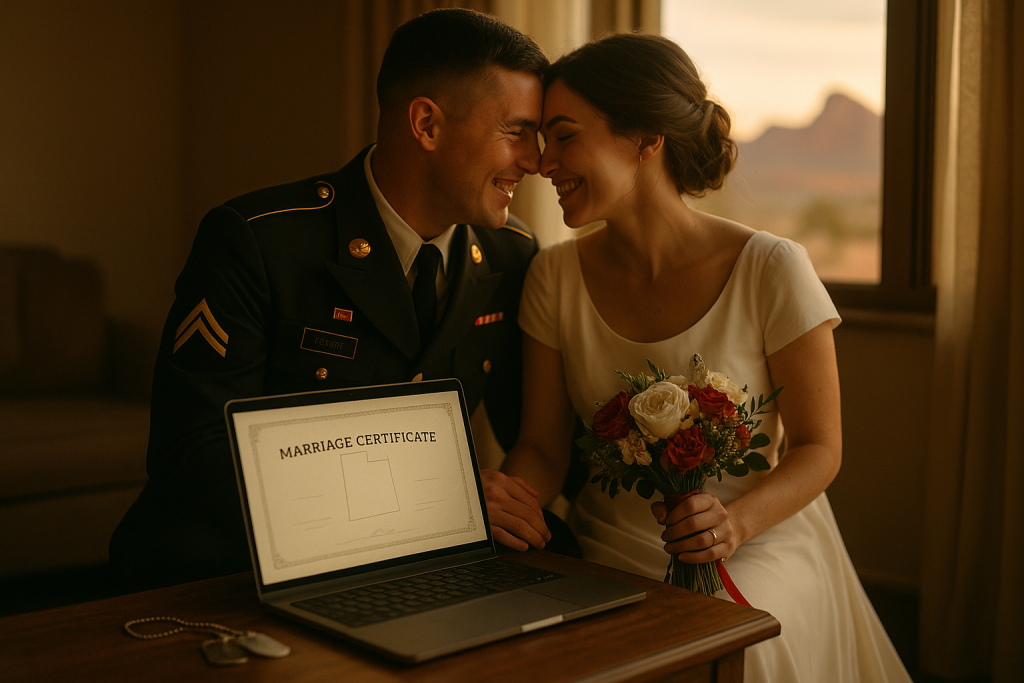In today’s fast-paced digital world, the allure of a quick and convenient virtual marriage is undeniable. However, rushing into an online wedding without proper preparation can lead to unforeseen challenges. To ensure your virtual marriage is both joyful and legally sound, it’s crucial to be aware of common pitfalls and how to avoid them.
Overlooking Legal Requirements
One of the most significant mistakes couples make is neglecting to understand the legalities of virtual marriages. Laws regarding online weddings vary by jurisdiction, and not all states or countries recognize them. For instance, while states like Utah have embraced online weddings, others may not. It’s essential to research and confirm that your virtual marriage will be legally recognized in your area. For a comprehensive overview, refer to our Legal Pros and Cons of Virtual Marriage in the US.
Failing to Verify the Officiant’s Credentials
Another common oversight is not ensuring that the officiant conducting your virtual ceremony is legally authorized to do so. Scammers often pose as licensed officiants without the proper credentials. To avoid this, always verify the officiant’s licensing and the company’s registration status. For more information on spotting and avoiding virtual marriage scams, check out our guide on How to Spot and Avoid Virtual Marriage Scams.
Ignoring Technical Preparations
Technical glitches can disrupt your special day if not addressed beforehand. Ensure you have a stable internet connection, test your video and audio equipment, and familiarize yourself with the virtual platform you’ll be using. Conducting a virtual rehearsal can help identify and resolve potential issues, ensuring a smooth ceremony.
Neglecting Cultural and Family Considerations
Virtual marriages may not align with cultural or family expectations. It’s important to communicate with family members and consider their feelings and traditions. Including them in the planning process or organizing a separate in-person celebration can help bridge any gaps and ensure everyone feels included.
Underestimating the Importance of Documentation
Proper documentation is crucial for the legal recognition of your marriage. Ensure you obtain a valid marriage license and that all necessary paperwork is completed accurately. Additionally, be aware that for immigration purposes, the U.S. Citizenship and Immigration Services (USCIS) requires proof of consummation for virtual marriages. Learn more about this requirement in our article on Why Consummating Your Virtual Wedding Matters for USCIS.
Overlooking Post-Ceremony Steps
After the ceremony, there are still important steps to take, such as obtaining certified copies of your marriage certificate and updating personal records. If your marriage certificate needs to be recognized internationally, you may require an apostille. Our Apostille Service can assist you with this process.
Not Planning for the Future
While a virtual marriage offers immediate convenience, it’s essential to plan for your future together. Discuss long-term goals, living arrangements, and how you’ll navigate challenges as a married couple. Open communication and planning can help ensure a strong and lasting relationship.
FAQs
Q: Are virtual marriages legally recognized everywhere?
A: No, the recognition of virtual marriages varies by jurisdiction. It’s crucial to research local laws or consult with legal experts to ensure your marriage is valid.
Q: How can I verify if an online officiant is legitimate?
A: Request their licensing information and cross-check with the issuing authority. Additionally, look for reviews or testimonials from previous clients.
Q: What technical preparations are necessary for a virtual wedding?
A: Ensure a stable internet connection, test your video and audio equipment, familiarize yourself with the virtual platform, and conduct a virtual rehearsal to identify and resolve potential issues.
Q: What is an apostille, and do I need one for my virtual marriage certificate?
A: An apostille is a certification that authenticates the origin of a public document for use in another country. If your marriage certificate needs to be recognized internationally, you may require an apostille. Our Apostille Service can assist you with this process.
Q: How can I ensure my virtual marriage is recognized for immigration purposes?
A: For immigration purposes, the USCIS requires proof of consummation for virtual marriages. It’s important to provide evidence that the marriage has been physically consummated. Learn more in our article on Why Consummating Your Virtual Wedding Matters for USCIS.
Embarking on a virtual marriage can be a wonderful and convenient way to unite with your partner. By being aware of these common mistakes and taking proactive steps to avoid them, you can ensure a smooth and legally sound union. If you have any questions or need assistance with your virtual marriage planning, feel free to contact Virtual Same Day Marriage today.




